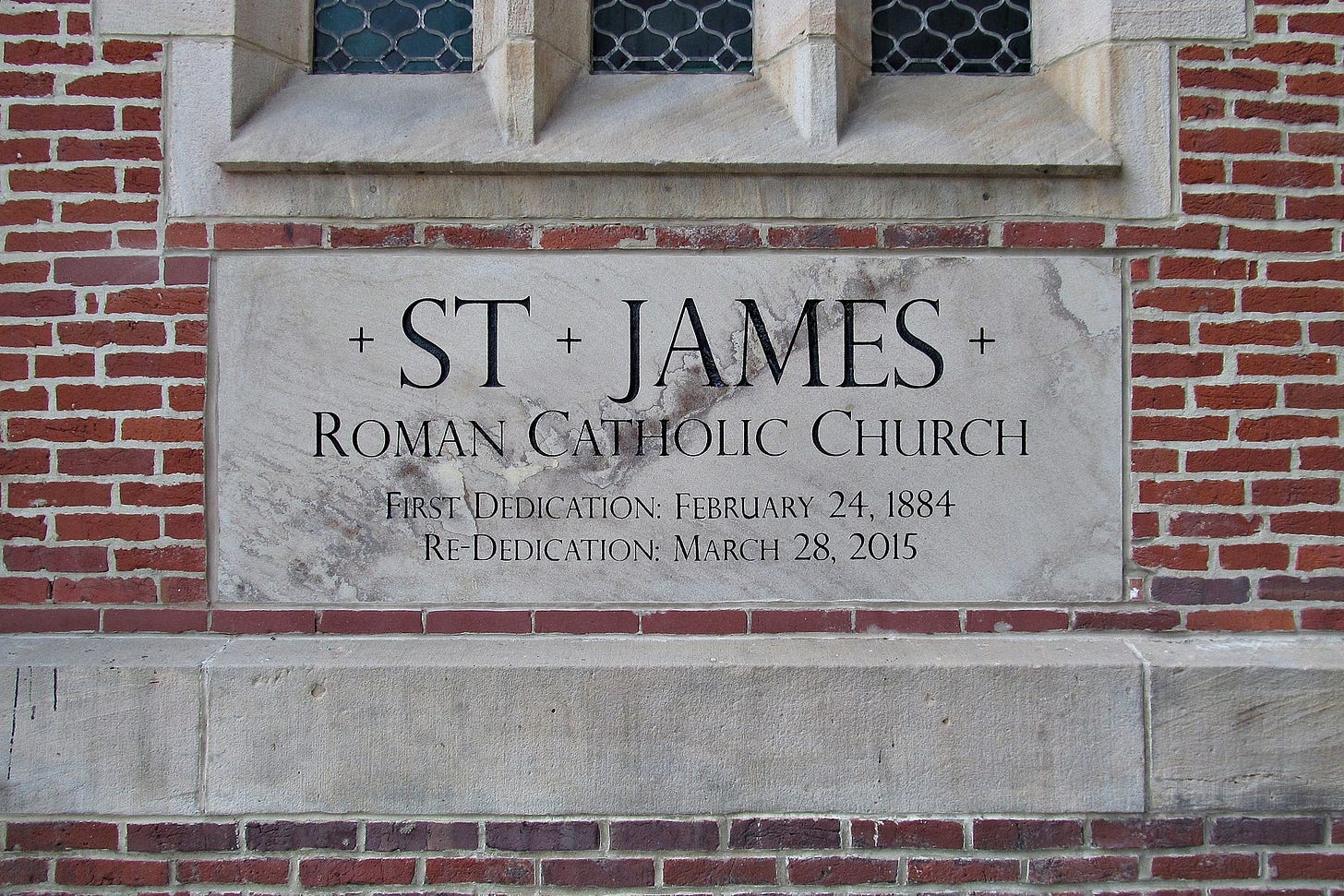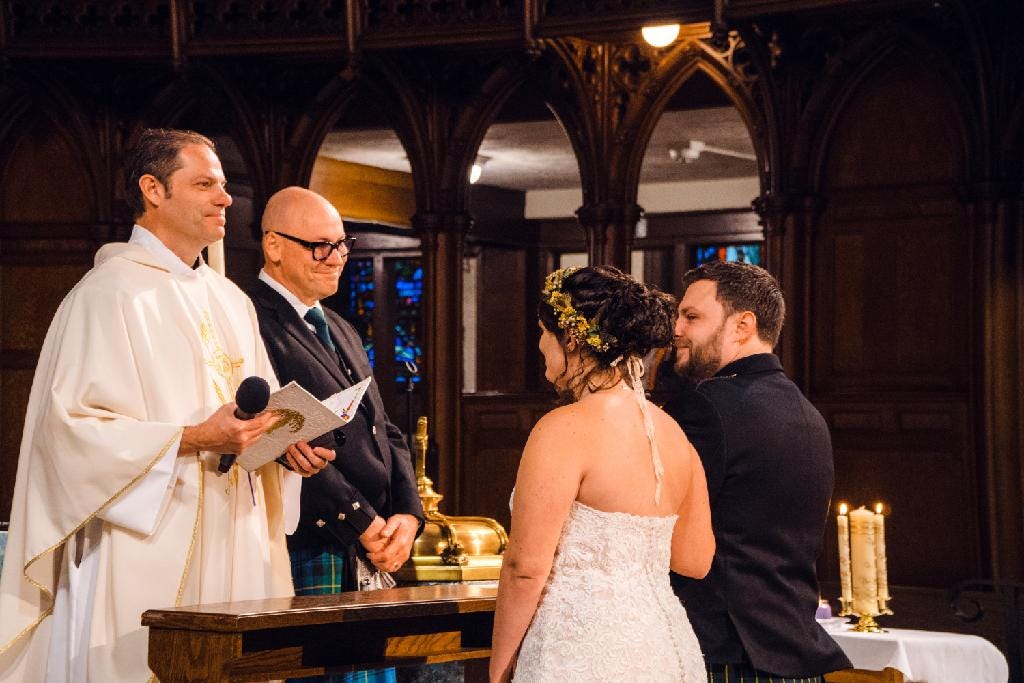Blessings from Another Altar
A while after a heart-wrenching breakup, my friend Robert became engaged to a lovely woman named Kelly. He’s young enough to be my son but he’s already an award-winning blacksmith and bladesmith. He is my mentor in both those disciplines. I love him like a brother and was delighted when I learned of his engagement and eventual nuptials.
While we didn’t talk much about our faiths while working at the forge (hearing protection is mandatory), we often talked late into the night about religion, theology, Mormonism, and Catholicism. Unlike many millennials, he is still actively involved in his parish, teaching catechism to adults. Robert knows his stuff. My undergrad degree is in Italian, which means I studied the politics of Catholicism, the papacy, and all the crazy that was Medieval and Renaissance Italy. Interestingly, rather than being defensive, he joked about the Borgia and Medici popes, the fundraiser that was the purchasing of indulgences, and the simony that ran through the Vatican like the Tiber River.
A few months before the big day, Robert mentioned that he and his fiancée Kelly hoped that I would give them a blessing at their wedding. My understanding of a blessing is a more laying-on-of-the-hands version, so I asked them what a blessing looked like to him. Robert explained that I would just stand as they knelt in front of me, and I would say what I wanted to say. “You know, bishop stuff.” I was just finishing my tenure as a bishop, and told him that I would no longer be a bishop. He said “Whatever, you’ll be a bishop emeritus or whatever.”
I told Robert I would be honored. So that’s how I was listed in the program: Darren Bush, LDS Bishop Emeritus.
A few months passed, and we texted and video chatted as we got closer to the wedding. His full name is Robert Burns, the most Scottish of all names. Of course he would be wearing his kilt. His brother and best man were wearing kilts. “What do bishops wear?” I told him we wear kilts.
It was time to honor the 40% of my genes from Scotland, though the 60% of my genes that are English were mortified. The good news is that the Gordon tartan is gorgeous. My wife’s mother was a Sinclair; also a beautiful tartan. We found a tailor in Scotland who makes kilts, and after measurements, many emails, and a phone call, we were on our way.
We flew into Pittsburgh a few days before the wedding for the rehearsal. After bestowing the wedding gifts of Wisconsin cheese, the ladies attended to their bridal preparations while Robert and I walked The Strip, the center of Pittsburgh food culture.
The rehearsal was at St. James Church, a lovely and substantial church built for Italian and German working class immigrants who worked in the steel mills. In a slightly decaying part of town, it stood as a beacon.
I met Father Tom Burke, a warm and friendly parish priest who didn’t take himself too seriously. A stately man with a little silver at the temples, he had successfully integrated two parishes, one primarily white, the other black. Father Tom had no pretense about his authority in terms of who ran the day-to-day of St. James, and deferred to the staff with respect and humor.
The rehearsal started and I sat in the congregation as they moved through the steps of how the standing, sitting, and kneeling was going to go. Father Tom said, “And then Bishop Darren will pronounce his blessing on Robert and Kelly.” I asked him if he would signal me to come up to the altar. He smiled and said, “No, you’re in the procession, right behind me.”
I became aware that I walked in with him from the sacristy, the room where the priest prepares for mass, vests himself in a fancy robe, and where the communion is locked up.
I asked Father Tom after I walked in, where would I stand?
“Next to me.”
The day of the wedding was joyous, despite the drizzly weather that made Pittsburgh seem a little gray and gloomy. The interior of the church was brightly lit and the Catholic equivalent of the Relief Society Presidency had prepared it to perfection. We arrived in our kilts, and Robert lit up as bright as the church. “Thank you, you guys look great.” We greeted his family. Half of them were about as warm, loving, and huggy as you can be, thanking us profusely for coming. “Your blessing means a lot to Robert and Kelly.” Those were the Scots. The others may have been less sure what to think. Who’s this bishop in a kilt? What’s a Mormon doing here? They were cordial, if a bit confused.
Father Tom gathered us in a circle in the sacristy and said “Let us pray. In the name of the Father, the Son, and the Holy Ghost…” He asked for the Holy Spirit to be present, to bless those who traveled so far, to help us perform our duties to God and to Robert and Kelly. Well, amen to that. Tom dipped his thumb in holy water and made the sign of the cross on my forehead. I had no adverse reaction.
The organ started and I followed Father Tom out the back door of the sacristy, around the hallway and across the front of the church to the altar. Father Tom parked himself in front of the kneeler for the bride and groom and motioned for me to join him. He began the mass by thanking everyone for coming, introducing himself, and introducing me, thanking me for officiating with him.
The wedding mass went on (they are not short ceremonies). After his remarks and the homily, Father Tom turned to me and said “It’s your turn.”
I addressed the couple and gave them advice as one might give in my old bishop’s office. Then I gave them the following blessing, looking down at their radiant faces.
Kelly and Robert, may God bless your union with joy in your posterity and a long life of happiness together, and may He bless you to keep sacred the vows you have made before God, Father Tom, and those congregated here.
I bless you that you will be Godly parents, that you will raise your children in faith and show them the ways of the Lord. I bless you that your children will bring a treasure of love to your home, and they will accept the teachings you show them, by word and more importantly, by example.
I bless you that you may be faithful in your service to our Lord Jesus Christ, true to your marriage vows, and true to your dedication to serving the poor in body and spirit, as our Lord has done.
I bless you that you may feel compassion for those who are hurting, physically and spiritually, and that you will be prompted by the Holy Spirit to help heal them in the way God directs you.
We are all sinners and can cause pain because of our imperfections, so I bless you with patience for each other, with your families, and with your community.
These blessings I invoke upon you in the name of our Lord, Jesus Christ, amen.
Then I sat down in my little chair over to the side of the altar to watch Father Tom prepare the communion. At this point, it was his show, and I, a grateful spectator. The reverence with which he prepared the eucharist was like watching a Japanese tea ceremony. Every movement had a purpose and showed respect for what Catholics believe is the body of Christ. I had never been so close to a priest preparing the eucharist, and I thought that it was beautifully symbolic of the Catholic belief in transubstantiation that the preparation was done in a way that no particle of the host was lost. While I understand perfectly well why our sacrament cleanup works differently, that seat let me see in Father Tom’s handling of the host and wine a reverence that we might miss in a more casual disposing of the remaining bread and water.. Something to learn, I thought. A little more respect for the emblems of the body and blood of Christ.
After communion was presented, Father Tom gave me the signal to return to his side as he blessed the rings. I picked up a small marble basin of holy water, and Father Tom sprinkled the rings with a small wand called an aspergillum, and pronounced them husband and wife. Lots of smiles and kisses, organ music and applause followed from the congregation. The lovely couple looked at us and we were all tearing up. Father Tom turned to me and embraced me. “Thank you for serving before the altar with me.”
I stood there for a moment, taking in the sights, and feeling the Spirit testifying to me that this is a place of love, and that I was supposed to be there. What I also felt is that while I was supposed to be there, I was a temporary guest in this beautiful church. As beautiful as it was, and as beautiful as the people were, it was not my spiritual home. But I was a most welcome visitor.
Darren Bush is a paddler, blacksmith, odonatologist, canoe designer, writer, and part-time hospice chaplain. He and his wife Stephanie own Rutabaga Paddlesports, an outdoor specialty shop in Madison, Wisconsin.









Thank you for this beautiful message of respect, connection and shared divinity!
I sure enjoyed reading this. Felt the love. 🤗